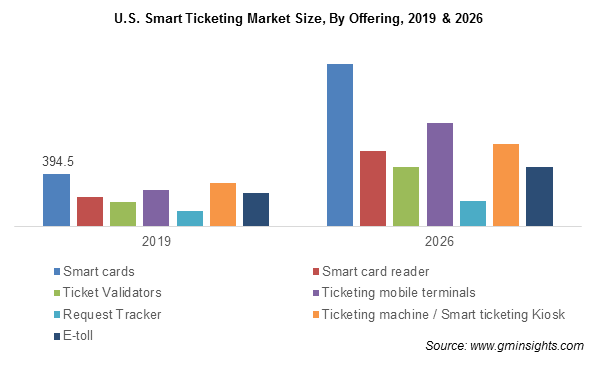Smart Ticketing Market worth over $20 Bn by 2026
Published Date: October 2020
Smart Ticketing Market size is set to cross USD 20 billion by 2026, according to a new research report by Global Market Insights Inc.
Growing smartphone penetration globally will surge the demand for smart ticketing solutions. Buying a ticket on a smartphone saves the hassle of carrying paper tickets while also enabling travelers to maintain precise record of their journeys. It also facilitates transport authorities with a centralized management system that provides them a clear picture of the number of travelers and payment transactions.
Government initiatives supporting transport infrastructure developments will propel the smart ticketing market demand. The developing network infrastructure globally, will aid in the deployment of smart ticketing to further enhance passenger travel.

Get more details on this report - Request Free Sample PDF
The coronavirus (COVID-19) pandemic is predicted to boost the smart ticketing industry statistics, as people prefer non-contact payment and access control to prevent the spread of the virus. International health organizations and government administrations are encouraging the use of contactless payment technologies to reduce the spread of the virus through physical contact.
Smart ticketing hardware to witness demand for efficient digitalized transport infrastructure without human intervention
Self-service kiosks at tram stations and bus stops enable passengers to pay for their journeys using smart cards as well as scan their cards or mobile phones at card readers. The surging integration of NFC technology in smart ticketing kiosks is likely to change the way of payment transactions. This technology enables customers to have touch-free transactions, which, in turn, are anticipated to positively impact the smart ticketing market revenue. The faster transaction and easy check-out offered by these machines help in reducing long passenger queues.
Browse key industry insights spread across 300 pages with 346 market data tables and 29 figures & charts from the report, “Smart Ticketing Market Size By Component (Hardware, Software, Service), By Offering (Smart Cards, Smart Card Readers, Ticket Validators, Ticketing Mobile Terminals, Request Tracker, Ticketing Machine/Smart Ticketing Kiosk, E-Toll), By Connectivity (RFID, Barcode, Near Field Communication (NFC), Cellular Network, Wi-Fi), By End-Use (Parking, Sports & Entertainment, Transportation [Roadways, Railways, Airways]), COVID-19 Impact Analysis, Regional Outlook, Growth Potential, Competitive Market Share & Forecast, 2020 – 2026”, in detail along with the table of contents:
https://www.gminsights.com/industry-analysis/smart-ticketing-market
Smart kiosks that enable to automate the ticketing process and ensure minimal human intervention
Innovative ticketing schemes are adopted by several local councils and transport schemes for minimizing the use of cash. These kiosks enable a customer registering a card to cancel or re-claim lost tickets. They can also advance purchase at convenient locations such as online, kiosks or ticket offices. Smart ticketing kiosks speed up boarding times and reduce queues. Self-service bus ticket kiosks allow connecting public administration with carriers, offering detailed and statistical information, while decreasing financial costs and improving human attention on areas of greater relevance.
Developing network infrastructures globally
Seamless availability of internet connectivity in developed as well as developing economies will facilitate the smooth access to apps and websites. The Asia Pacific Information- Superhighway Initiative (AP-IS) aimed at strengthening the network infrastructure to increase the availability & affordability of internet across the region will support the smart ticketing market expansion. The roll out of 5G in countries, such as the U.S. and Germany, will further ensure seamless connectivity, in turn, surging the demand for advanced ticketing solutions.
Transportation sector adopting advanced digital technologies
The transportation sector accounted for more than 45% of the smart ticketing market share in 2019. In July 2020, Monetary Salinas Transit collaborated with Caltrans and Visa to deploy contactless fare payment technology in buses for passenger convenience. Smart cards that can hold a range of tickets, other transport products, and third-party services are being implemented by transportation authorities.
Rising smart city projects in Asia Pacific
Smart city development projects in countries, such as Singapore and Australia, will spur the demand for advanced ticketing solutions. The market will also gain traction in countries, such as South Korea and India, due to the growing penetration of digitalization across the transport sector.
Launching new solutions to strengthen market position
Key smart ticketing market players include Gemalto NV (Thales Group), Giesecke & Devrient, GmbH, CPI Card Group Inc., Cubic Corporation, Infineon Technologies, Rambus Inc., NXP Semiconductors N.V., Softjourn, HID Global Corporation (ASSA Abloy AB), Idemia, Ticketer, and Xerox Corporation. Companies are integrating advanced technologies into their solutions to develop new products for catering to the transport sector requirements.
Preeti Wadhwani, Saloni Gankar